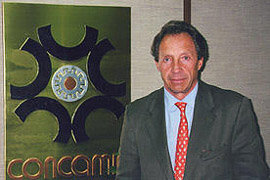 Expanding
Frontiers with the New EU Agreement Expanding
Frontiers with the New EU Agreement
The European Union trade bloc negotiated the accord with Mexico to give it equal footing with NAFTA's members, and hopefully allow it to catch up on commercial globalization that North American countries, especially the U.S., have an edge on. Signed in March, the agreement takes effect July 1, for goods only, while services and investment will follow. By 2007, the agreement will allow for 100% duty-free Mexico-EU trade of industrial products, 62% of agricultural product commerce, and 99.5% of trade from the fisheries sector, to be phased in gradually. The EU will lower tariffs on 82% of Mexican industrial goods immediately, and Mexico in turn will cut tariffs on 48% of European industrial goods. In 2003, Mexican exports will enter Europe duty-free, while 53% from the EU will enter with reduced tariffs, and tariffs on other products will be reduced to a maximum of 5%.

Consensus on such touchy agricultural subjects as cereal, dairy products and meat, could not be reached, leaving those products to be left out of the accord, but headway on other sticking points such as auto parts manufacturing, orange juice, avocados and cut flowers was made. The EU will enjoy tariffs on their cars dropping from 20% to 3.3% and then disappearing by 2003, making possible coveted access to the U.S. market. The agreement also sets out disciplines for trade in services and gives both parties access to government procurement markets. As President Zedillo so aptly put it, Mexico "will be the only nation with free trade agreements negotiated with the two most important markets in the world: North America and the European Union." "Mexico has a wealth of natural resources, and has finally learned to meet its challenges and is open to the business world," said Alejandro Martinez Gallardo , President of CONCAMIN, the Federation of Industrial Chambers . |
 The
Anchor of the Future The
Anchor of the Future

The export industry's most dynamic sector is by
far the manufacturing sector. Not long ago the
nation was heavily dependent on its oil exports,
and only in the last six years has it made the
important transition to diversifying its markets.
Last year, Mexico exported for a total of $137
billion, of which 90% came from manufactured goods
such as automotive vehicles - with about 1 million
vehicles exported, electronics, auto-parts, electrical
appliances and textiles. The EU Free Trade Agreement
is sure to engender a new fountain of investment
into the sector as well.
"The treaty will attract a lot of European investors
to Mexico, who aim to penetrate the North American
market from here," CANACINTRA's Yañez predicted.
Foreign maquiladoras, or in-bond export manufacturers
that mushroomed in Mexico following the signing
of NAFTA to springboard to other markets, will
likely surge as Europeans find value added reasons
to set up shop in the nation. Manufacturing industries
are very interested in the European Union market,
because "it is as important as NAFTA" markets,
CONCAMIN's Martinez said.

But investors aren't the only ones to benefit
from a new market. Greater inflows should trickle
down from the development of the nation's infrastructure
to reach the inhabitants, as more jobs are created.
Mexico requires at least 1 million new jobs per
year and the industrial sector generates 4 ½ million,
according to CONCAMIN . Foreign direct
investment in 2000 is expected to provide over
46,000 new jobs, according to Trade Minister Blanco.
More investment will also result in a better standard
of living for the Mexicans, the CCE's Marin said.
Marin also sees the EU-Mexico accord affecting
the competitiveness of Mexico. "The U.S. is a
very competitive market, but with different characteristics
than the European market, the latter requiring
greater technology, and even higher quality, at
least in some sectors. That is going to motivate,
or force us, so to speak, to have better technology
and quality," he emphasized.
|

